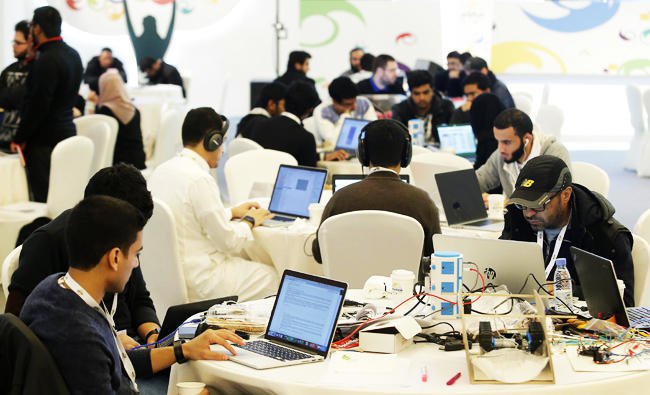
New technology deals could set Saudi Arabia on a path to rapid innovation
Saudi Crown Prince Mohammed bin Salman is expected to meet technology titans in the US over the next week, as the Kingdom embarks on a technology-driven economic transformation.
Saudi Arabia has embarked on a major investment push into technology, which includes a $3.5 billion deal with Uber in 2016 and the creation of a massive tech fund with Japan’s SoftBank Group.
The crown prince’s two-and-a-half-week official tour of the US includes a push for Amazon to consider working with the Saudi Energy Ministry to build a data center in the country, as well as digitization services for national oil giant Aramco, Bloomberg reported.
“After the recent announcement regarding the Vision Fund’s investment in the world’s biggest solar power project in Saudi Arabia, international analysts are on the edge of their seats in anticipation of what might happen during the crown prince’s visit to Silicon Valley,” Wes Schwalje, COO of research firm Tahseen Consulting, told Arab News.
“We’ll likely see some big announcements regarding partnerships between flagship Saudi companies and government entities and prominent tech start-ups in the artificial intelligence (AI), robotics and autonomous vehicle sectors.”
Schwalje said he expects to see more partnerships announced that support the Kingdom’s Vision 2030 social and economic diversification blueprint.
“For example, during the crown prince’s UK visit a deal was signed with Medopad and Johnson & Johnson to utilize artificial intelligence to complement the Kingdom’s current initiatives to digitize health care as part of the National Transformation Program,” said Schwalje.
Scott Lucas, professor of international politics at the University of Birmingham, said the crown prince’s US meetings with tech titans also have strong PR value and reflect the Kingdom’s technological ambitions.
Transforming Saudi Arabia into the next Silicon Valley is a “big ask,” but “it’s never too late to get into the game of technology,” Lucas said. “If you don’t get into digital, you’ll get left behind.”
Saudi Arabia faces a major challenge in developing a domestic technology industry, he said. “The Kingdom has faced this type of problem before, when it had to get the oil and gas out of the ground,” he added.
“How did they do it, and how did they get the skills and technology to do it? They worked with partners. But when it comes to a digital economy, how do you get it? Where do you buy it?”
John David Lovelock, chief global forecaster at IT research firm Gartner, said: “If Saudi Arabia wants to be the Silicon Valley of the Middle East, it will need to provide access to skilled labor, as well as the ability to support this labor. It will also need strong IT regulations, reliable energy and good internet.
“The tech recruitment strategy has to be approached in multiple ways. You can’t train up the workforce as quickly as you need them, but then again you can’t create an entirely imported force.
“You have to have some skin in the game. Silicon Valley has a mix of imported and home-grown talent.”
It is not too late to create a global technology hub, Lovelock said. “There are three tech areas that don’t yet have a recognized global hub: The Internet of Things, AI and digital business.
“No one country has yet claimed the global crown for AI. There are many countries that would like to claim the crown, but at the moment it’s not settled,” Lovelock said.
“I’d advise any country now to focus on becoming a tech hub as the market is growing and growing.”

























